Key takeaways:
- The death penalty issue is profoundly intertwined with justice, morality, and human rights, disproportionately affecting marginalized communities.
- Activism against the death penalty has historical roots, with significant contributions from figures like Cesare Beccaria and organizations like the ACLU, highlighting wrongful convictions and systemic biases.
- Personal narratives gained through activism emphasize the human cost of the death penalty, fostering community and solidarity among advocates.
- Future advocacy goals include amplifying marginalized voices, building coalitions with other social justice movements, and actively engaging policymakers for legislative change.
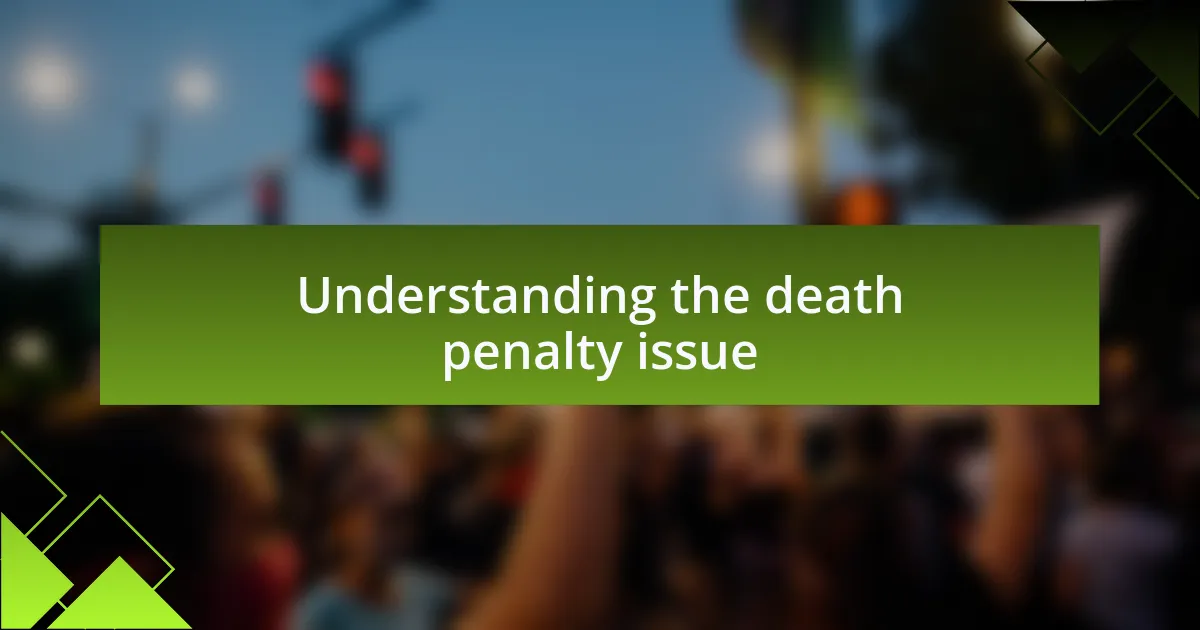
Understanding the death penalty issue
The death penalty is a complex and deeply polarizing issue that raises fundamental questions about justice, morality, and human rights. As I delved into activism, I often found myself wrestling with the emotional weight of the lives at stake. How can we, as a society, justify a punishment that is irrevocable, especially when there’s always a chance of error in the justice system?
Through my journey, I learned that the death penalty disproportionately affects marginalized communities. I recall attending a rally where a mother shared her grief over losing her son to wrongful execution—a poignant reminder of the human cost of our judicial policies. How do we reconcile our pursuit of justice with the reality that our systems are flawed?
Understanding the death penalty issue goes beyond statistics; it is about recognizing the humanity within each case. I often think about the personal stories behind the headlines. Why are we so quick to label someone as deserving of death, when their circumstances may be shaped by systemic issues like poverty or lack of education? This question has guided my activism and deepened my understanding of the pressing need for a more equitable system.
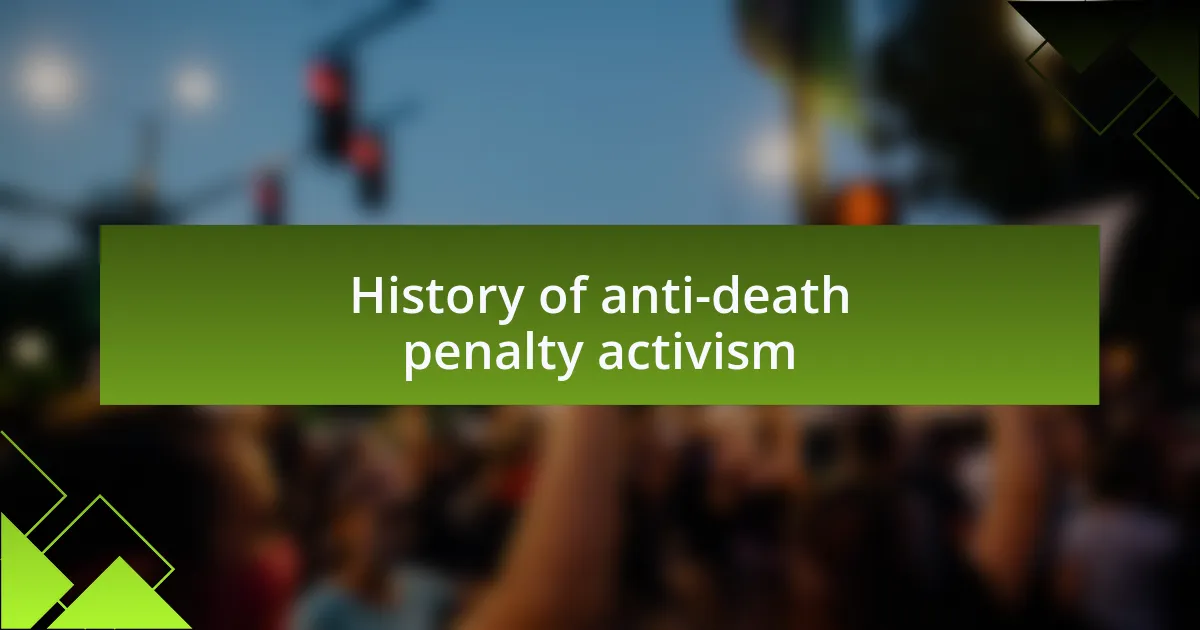
History of anti-death penalty activism
The roots of anti-death penalty activism can be traced back to the late 18th century, when advocates began questioning the moral implications of capital punishment. I remember reading about Cesare Beccaria, whose 1767 work “On Crimes and Punishments” argued against the death penalty, emphasizing the importance of rehabilitation over retribution. It was inspiring to see how one voice could ignite a movement questioning the very foundation of state-sanctioned killing.
As the 20th century progressed, various organizations and influential figures emerged to challenge the death penalty on civil liberties grounds. I was particularly moved by the efforts of the American Civil Liberties Union (ACLU), which played a pivotal role in raising public awareness about wrongful convictions and the potential bias in the justice system. Their stories about individuals like Gary Graham, executed despite evidence of innocence, bring to light the unsettling reality of errors that can occur when life and death decisions are made.
The 21st century has witnessed a surge in grassroots movements, fueled by personal narratives and emotional connections to the injustice of the death penalty. In my experience attending a community forum, a survivor recounted their harrowing journey of exoneration after years on death row, emphasizing how their story could have easily been forgotten. How many stories like theirs remain untold, I wondered, as we push for a future where justice is truly blind?
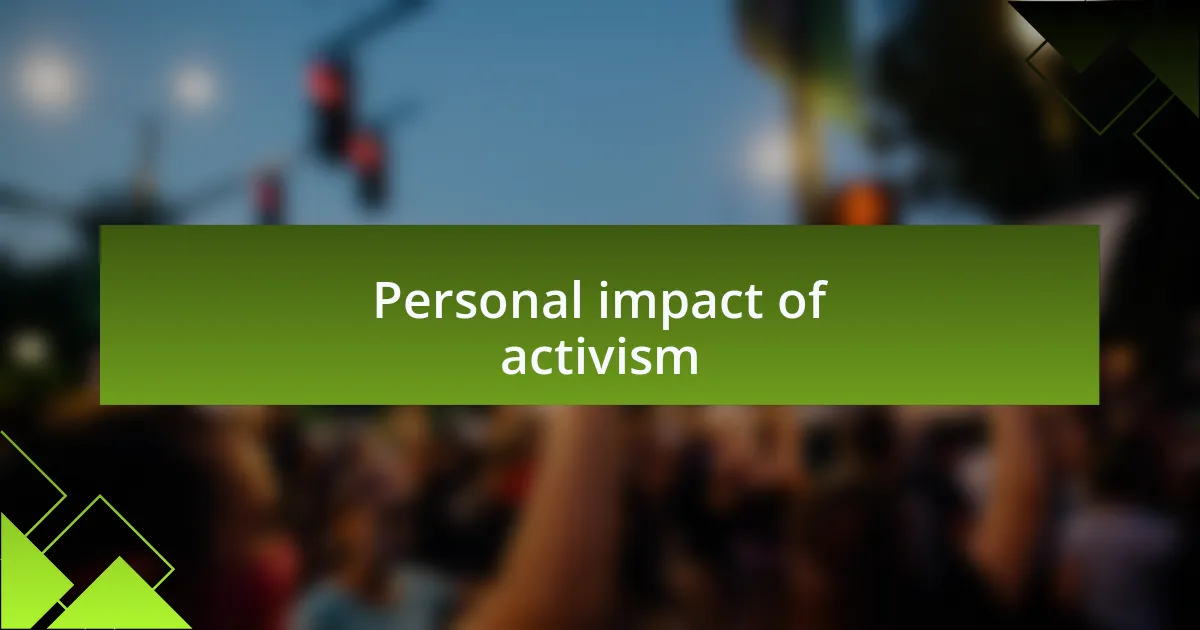
Personal impact of activism
The personal impact of activism is profound and transformative. I remember my first rally; the energy in the crowd was electric, but what struck me most was the expressions on the faces of those sharing their stories. Each testimony wasn’t just words; they were a heart-wrenching reminder that each number on a statistic represents a real human life. It made me realize that activism isn’t just a movement—it’s a deeply personal commitment to amplifying voices that might otherwise go unheard.
Engaging in this work has reshaped my understanding of justice. Often, I reflect on moments where I’ve met family members of death row inmates who spoke about their loved ones with such love and longing. Hearing their pain and hope firsthand made the issue feel so much closer and personal. It raises vital questions within me, like how can we allow such irreversible actions when each life has a story worth fighting for?
Through my activism journey, I’ve experienced a unique sense of community. Connecting with people who share the same passion and commitment to abolishing the death penalty has brought incredible support and solidarity into my life. I’ve learned that while activism can feel daunting, it’s also filled with moments of joy and hope—whether it’s a small victory in legislation or simply sharing a knowing smile with fellow advocates. Isn’t it true that sometimes a shared mission can bind us in ways we never expected?
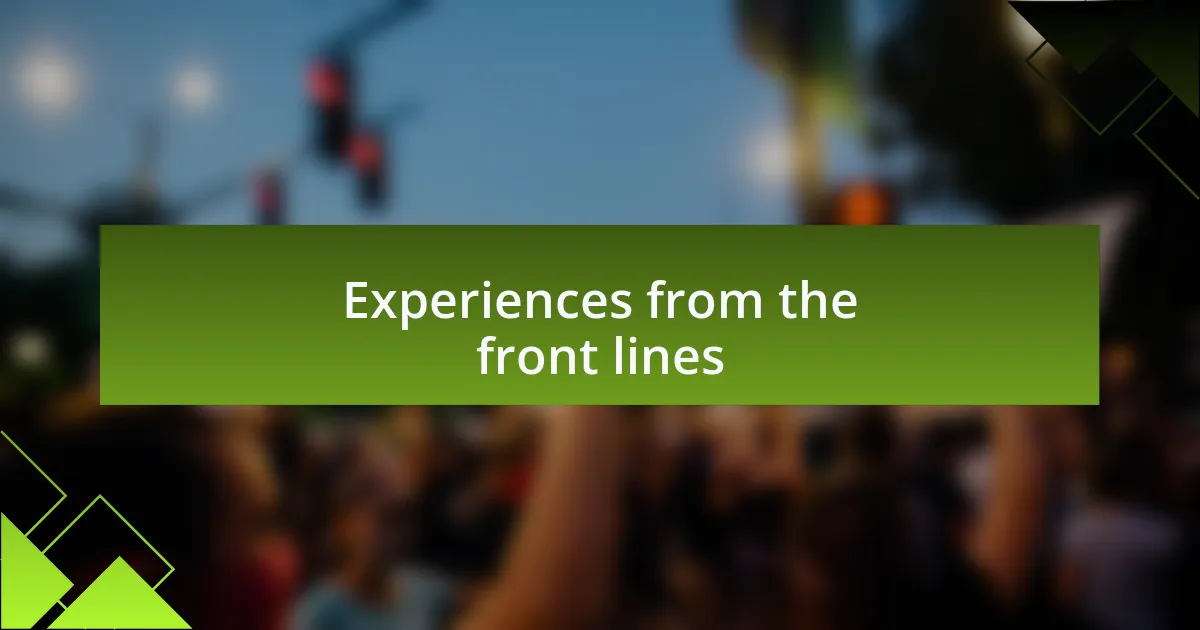
Experiences from the front lines
When I stood outside the courthouse during a crucial hearing, the tension in the air was palpable. I witnessed firsthand the deep-seated anxiety etched on the faces of the families waiting for a verdict—not knowing whether their loved ones would live or die. This moment cemented my belief that every protest, every speech, and every conversation matters. How can we not stand firm in the face of such uncertainty?
During a late-night strategy meeting with fellow activists, I remember someone sharing their personal connection: a brother on death row unjustly accused. The candlelight flickered, illuminating the tears in their eyes and a quiet strength in their voice. It was a powerful reminder that our work goes beyond policy; it’s about real lives, real pain. How can we reconcile our commitment to justice with the stories that unfold around us?
I once attended a vigil held for an executed inmate, where each candlelight symbolized hope lost. As we listened to the speakers share stories of love, legacy, and loss, I felt an overwhelming sense of solidarity. I wondered, what can a single voice do amidst such despair? Yet, there I stood, realizing that together we could create a symphony of change, each note resonating with the promise that we would not forget.
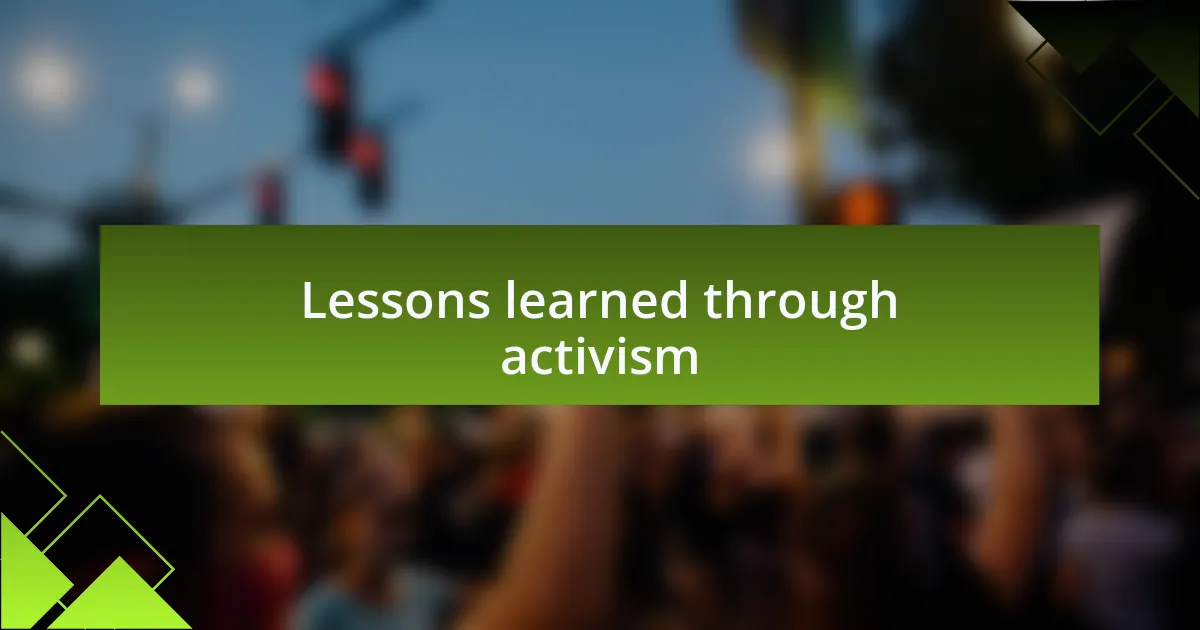
Lessons learned through activism
Activism has taught me that the path to justice is often filled with unexpected lessons. I recall a day at a community forum where I expected to share facts and statistics, but what resonated most was a young woman’s passionate plea for her brother’s life. Her vulnerability opened my eyes to the emotional weight our often abstract campaigns carry. How could numbers compete with the raw, human stories that demand our attention?
I’ve learned that listening is as vital as speaking. At an outreach event, I engaged with a former death row inmate who shared his harrowing experience of surviving the system. His insights shifted my perspective, illuminating the intricate flaws within the judicial process that statistics alone cannot convey. How often do we dismiss personal narratives when formulating our viewpoints?
A critical lesson I discovered is the power of community. During a vibrant rally, I was struck by the diverse individuals united in a shared cause, each carrying a unique story threaded into the fabric of our movement. The realization that we are stronger together fueled my resolve. What happens when collective voices rise in unison against injustice? I believe that change becomes not just possible, but imminent.
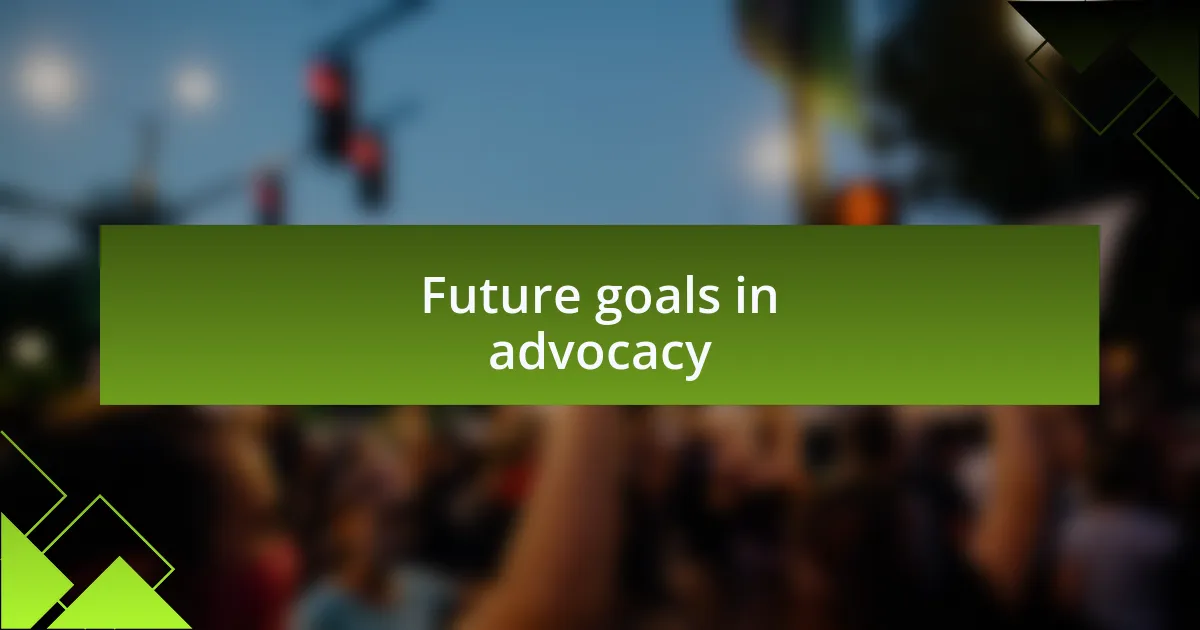
Future goals in advocacy
As I look ahead to the future of advocacy, I feel a deep responsibility to amplify marginalized voices, especially those impacted by the death penalty. I remember attending a workshop where a mother shared her grief over losing her son to state-sanctioned execution. Her story reminded me that behind every case is a family forever changed. How do we ensure these heartbreaking narratives are at the forefront of our advocacy efforts?
Building coalitions with other social justice movements is another important goal I envision. Collaborating with groups fighting for reform in areas like criminal justice and racial equality can strengthen our voices. When I joined forces with a local organization focused on wrongful convictions, I was amazed at the common ground we shared. What possibilities arise when we align our objectives and resources toward a collective fight against systemic injustices?
In the context of legislative change, I aim to engage more actively with policymakers who hold the power to influence laws. Recently, I participated in a lobbying effort, speaking directly to representatives about the ethical implications of the death penalty. It was empowering to articulate the values we stand for. How can we create a sustained dialogue that pushes lawmakers to reconsider their stance and embrace a more humane approach?